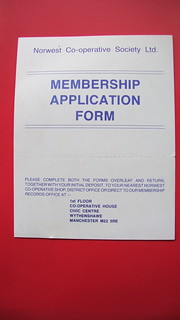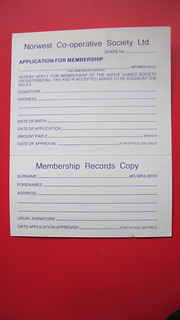What could have been on the mind of those co-operators starting with a shop on Great Ancoats Street back in 1859 was the number previous ventures in collective enterprise that had struggled in their trading.
We know about these early co-operative stores through the writings of J.M. Ludlow (John Malcolm) who made a tour of Lancashire and Yorkshire in 1850. He was a barrister in London and a central figure in the Christian Socialists. These chaps were inspired by the co-operative producers in France and the Chartists and the most noted of them was Charles Kingsley, who wrote under the pen name of Parson's Lot and became famous with a books called "The Water Babies" and "Alton Locke".
Though J.M.Ludlow favoured producer co-operatives over consumer co-operatives his reports tracked down several Societies retailing in Manchester and Salford. G.D.H. Cole writing "The Century of Co-operation" in 1944 is a touch scathing about him thinking co-operative principles were in a few people making hats together rather than members owning shops and paying dividend.
- Jersey Street Co-Operative Society, three stores and a bakery in Ancoats.
- Garrett Road Industrial, a co-operative store in Miles Platting
- Hudson Street, Salford, a co-operative store
- Harpurhey, a new co-op society
- Dyers' Trade Union, two stores, though he disapproved, holding them devoid of true co-operative principles
- Central Co-operative Agency, a branch at 13 Swan Street.
- Garden Lane, Salford, a co-op store and manufacturing with looms for some of its members.
There were others. The historian today trawls through online digitized newspapers looking for entries and finds a Chartist Co-operative Store in Hulme, or a case of embezzlement at the Flixton Co-operative and that's a small village west of Manchester near the River Irwell. The young Ludlow would be making enquiries in the terraced house districts of industrial Manchester for a small business run on co-operative principles.
In 1851 there was a Co-operative Conference in Bury in the April with 44 north of England co-ops attending, with 80 delegates, most of them from stores rather than workshops. Later in September there was a meeting of Associative Labour in Manchester with trade unionists, co-operators and sympathisers. The Rochdale Pioneers attended both meetings.
Small organisations only get their history written about if they survive long enough and grow big enough. Who knows anything about the Manchester Equitable Pioneers Co-operative attending the Bury conference? What happened to the Jersey Street Co-operative? Then the oldest in Manchester said their delegate Mr. Knight. "
It started by offering 10s. shares (50p) with about 80 or 90 taken up. A capital of £400 and business of £120 weekly."
The success of the Manchester & Salford Equitable Co-op wasn't assured when they started in 1859 but would have learnt that lack of capital and not attracting members would mean ultimate demise.
Photograph courtsey of Manchester Libraries Image Collection. It is Jersey Street in 1967, m10166, and looks like it hadn't changed since the start of the century. Don't know which building on Jersey Street was occupied by a co-operative store.
 To promote the newly refurbished
Rochdale Pioneers Museum there is a display of photographs with text at the Unicorn Co-Operative Grocery store in Chorlton.
To promote the newly refurbished
Rochdale Pioneers Museum there is a display of photographs with text at the Unicorn Co-Operative Grocery store in Chorlton. Fortunately the Co-operative Union had the foresight back around 1925 to buy the property when it was a pet shop and turn it into a museum.
Fortunately the Co-operative Union had the foresight back around 1925 to buy the property when it was a pet shop and turn it into a museum.




